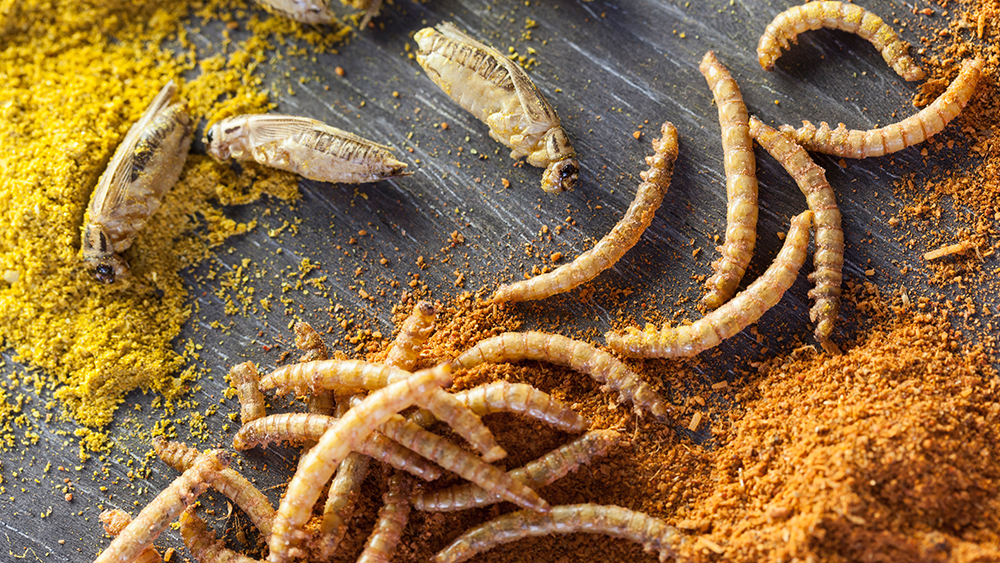Elementary school kids in the Netherlands BRAINWASHED to eat worms
02/14/2023 / By Ramon Tomey

Elementary school-age children in the Netherlands are being brainwashed to eat worms.
According to a video by the Dutch news outlet RTV Oost, the brainwashing campaign was first launched at the Octopus primary school in the city of Zwolle, in the northeastern province of Overijssel. As part of the campaign, the school’s canteen served mealworms, lupine worms and other bugs for students to try.
Pupils from the Octopus school carefully put the mealworms in their mouths after initially hesitating to do so. Gert Harm ten Bolscher, a member of the executive council for Overijssel province, also joined in to have a bite of the worms. Only a few found the insects appetizing.
The provincial government created 100 teaching packs for edible insects, in collaboration with Wageningen University & Research, and made them available to 100 primary schools in Overijssel. It remains unknown if the parents agreed to, or were made aware of, these questionable nutritional experiments. (Related: Schools in Dutch province serving INSECTS to students.)
The push to feed children with bugs mirrored a similar instance in the United Kingdom, which Breitbart expounded on in a May 2022 report. The program involved four primary schools in Wales eating insects, with two study organizers sharing details about it.
Cardiff University‘s Christopher Bear said the study seeks to make children “think about alternative proteins as real things for now, rather than just as foods for the future. His colleague Verity Jones of the University of the West of England, meanwhile, said the findings of their study could suggest ways to weaponize children as “agents of dietary change.”

“I have found that once children know that insects are already … in many of the foods we eat, and are assured that they won’t be ill from eating them, they are very open to trying,” Jones said. “All research for adults and children indicates whole insects are off-putting, but ground-up insects within foods are very acceptable.”
British government to make African kids eat bugs
It appears that Dutch and Welsh children are not the only ones being groomed to eat insects. Children in the African nation of Zimbabwe would be subjected to eating “insect-based porridge foods,” based on a September 2022 report by LifeSiteNews.
According to the piece, the British government is funding an experiment in Zimbabwe to see the effects of an insect diet on the height, weight and micronutrient status of children. The study would also look at the children’s cognitive function, as determined by their school performance. It is funded by U.K. Research and Innovation, an agency attached to and funded by the British Department for Business, Energy and Industrial Strategy.
As part of the study, children will be fed porridge with powdered mopane worm and soldier termite on a daily basis for a year. According to the project summary, the consumption of the two insects is “culturally acceptable” in the African region. It even cited how Zimbabwean rural communities consumed mopane worms and soldier termites to avoid malnutrition during drought and poor harvests.
The project description stated that even though “the mechanistic link between insect consumption and health is missing,” edible insects are “a valuable source of nutrients including essential amino acids, mineral content and essential fatty acids.”
Head over to CricketProtein.news for more stories about the push to normalize insect consumption.
Watch this Russia Today report about the European Union ruling that mealworms are safe to eat.
This video is from The Prisoner channel on Brighteon.com.
More related stories:
Footage of cricket farm in Canada highlights globalist push to replace beef with bugs.
WaPo tells poor Americans to EAT BUGS this Christmas.
Sources include:
Submit a correction >>
Tagged Under:
brainwashed, campus insanity, children's health, clean food watch, crickets, edible insects, Food Evolution, food supply, franken food, indoctrination, left cult, mealworms, mopane worms, Netherlands, propaganda, public education, soldier termites, United Kingdom, Wales, Zimbabwe
This article may contain statements that reflect the opinion of the author




















